HE made national and international headlines with more than 72,000 shrouded figures starkly depicting the human sacrifice of the First World War.
Washford artist and sculptor Rob Heard worked seven days a week for over three years on the massive project to commemorate every British and Allied Serviceman killed on the first day of the Battle of the Somme, for which he was awarded the MBE.
From his remote tree-shrouded studio at Bardon, Rob has now launched another epic and controversial project: to make more than 11,000 figures highlighting the plight of children as young as six years working in foreign sweatshops to provide bargain-price clothes.
Titled ‘The Machinists’, the huge installation will cover half the size of a football pitch and depict figures crouched over sewing machines in different colours which will spell out stark messages about the plight of millions trapped in what has been called modern slavery.
As with his ‘Shrouds of the Somme’ installation - seen by 200,000 people including Princess Anne and then-Prime Minister Theresa May and 15 million on YouTube - Rob is single-handedly making all the figures.
Already, there has been intense interest in the new project from film-makers, the American media, and anti-slavery organisations, including one headed by Nobel Peace Prize winner Kailash Satyarthi, which campaigns against child labour in India.
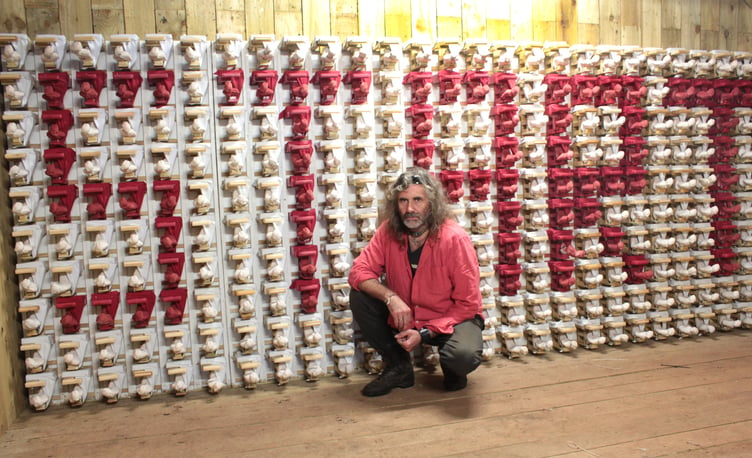
+ 1
(View All)
A section of artist Rob Heard's latest installation.
The amount of help, sponsorship, and support Rob gets will determine how long the project takes, but he would like to launch it in time for next year’s Anti-Slavery Day, in October.
Giving the Free Press a preview of the wall of red and white figures containing the word ‘START’, which is in the first section of the installation, Rob says: “I know this is highly controversial stuff which is going to ruffle a lot of feathers.
“In fact, we want to try to avoid confrontation and instead work with people in the clothing industry to try to improve a very serious situation.
“The next step is to approach major retailers who get cheap clothing from abroad to give them a chance to put their side of the story, and then to approach potential sponsors and funders, including charities and universities.
“The knee-jerk reaction of some retailers will probably be to ignore us or to resist what we are trying to achieve - which is to work together to try to make things better.
“I don’t think we can basically change the exploitation of child labour because millions of people depend on it.
“What we can do is to support the people working on the front line to free children from the present kind of slavery and give them a future.
“The shrouds raised £53,000 for Services charities and the hope is that The Machinists will also be able to fund the people trying to give the children a better life and who are often risking their own lives in the process.
“We’re talking about children of six or seven being sold into slavery by their parents because it’s the only choice the family has.
“Our children go to school safely. They get healthcare and can look forward to a happy life, but the clothes they are wearing could have been made by children younger than them.
“Some of the worst conditions are found on the Indian continent and African countries.
“If The Machinists can shine a light on modern slavery and make anyone more aware of what is going on, it will all have been worth it.”
A consummate craftsman, Rob, now 58, began his career making large-scale wooden structures with his brothers, but in 2013 came a cataclysmic change in lifestyle when Rob’s van was hit by an out-of-control car, damaging both his hands.
The idea of the Shrouds of the Somme came to him when he was recovering from the crash and someone told him that a million men had died in the disastrous campaign and he realised how difficult it was to visualise that sort of number.
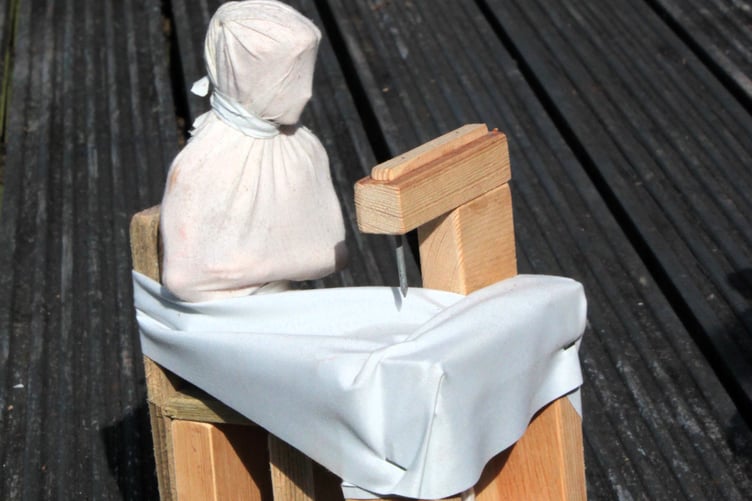
He said: “I came up with the idea of making a hand-crafted effigy of everyone who had died on the first day on the Somme, and those with no known grave, and recording all their names.”
Sometimes, he worked almost round the clock making around 200 shrouds a day.
“I think I had an hour off at Christmas,” he remembers. “It was important to me that I did the job myself and also that I did it by hand.”
The shrouds were displayed in Exeter, Bristol, Salisbury, and Belfast and attracted vast crowds.
Arriving at London’s Queen Elizabeth Olympic Park, and spaced two inches apart, the shrouds took up the space of two football pitches.
Rob says the award of the MBE took him by surprise.
“I don’t know if I deserve it,” he said. “But the shrouds do.”
Rob’s production of figures at their sewing machines is currently around 25 a day and now totals about 1,200.
“I chose sewing machines because the clothing industry is the most common example of modern slavery but it’s also involved in pretty much everything we consume, from cosmetics to car paint,” he said.
“We get goods and clothes cheaply because millions are being exploited and underpaid for what they do in conditions we would never allow in this country.”
“I just hope that the installation will make people aware of what’s going on and encourage them to help.
Rob paid a warm tribute to staff at the Watchet branch of builders’ merchants CRS who are supplying him with recycled scrap wood.
“They’ve been a tremendous help, I wouldn’t have got this far without them,” he said.
For further information on the project, visit Rob’s website here.

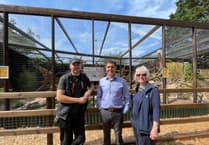
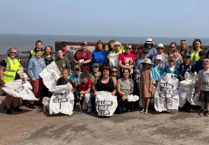
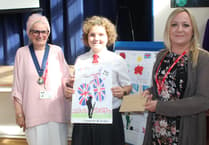

Comments
This article has no comments yet. Be the first to leave a comment.